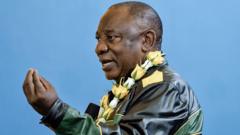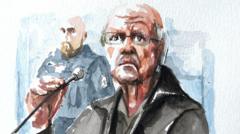**The encounter highlights Trump's long-standing focus on racial narratives, raising questions about race relations in South Africa and the U.S.**
**Trump's Controversial Stance on Race and South Africa: A Reflective Analysis**

**Trump's Controversial Stance on Race and South Africa: A Reflective Analysis**
**President Trump positions himself as an ally to white South Africans in a contentious Oval Office meeting with President Ramaphosa.**
In a recent Oval Office meeting, President Donald Trump took the opportunity to present himself as a defender of white citizens in South Africa. During his discussion with South African President Cyril Ramaphosa, Trump made claims about the purported execution of white people, referring repeatedly to “dead white people.” His remarks sparked a confrontation with Ramaphosa, who is intrinsically linked to the struggle against apartheid's racist policies in South Africa.
Trump's questioning of Ramaphosa left little room for a factual rebuttal. While statistics from law enforcement in South Africa do not support a narrative of heightened risk for white individuals, the American president's claims reflect a broader theme of racial grievance that has characterized his political tenure. For Trump, the narrative positions white people as victims, suggesting that Black citizens and other minorities have gained unfair advantages in societal, political, and economic spheres.
Drawing upon the legacy of Nelson Mandela, Ramaphosa attempted to steer the conversation toward civility and mutual respect. His efforts illustrated a stark contrast between his approach to inclusivity and Trump's rhetoric, which often emphasizes division. The meeting serves as a reminder of the complexities surrounding race, both in the context of South Africa's historical landscape and in the wider American dialogue on racial justice and equity.
As these interactions unfold on the international stage, they highlight the persistent tensions in race relations, revealing the challenges both countries face in reconciling their respective histories and contemporary realities.
Trump's questioning of Ramaphosa left little room for a factual rebuttal. While statistics from law enforcement in South Africa do not support a narrative of heightened risk for white individuals, the American president's claims reflect a broader theme of racial grievance that has characterized his political tenure. For Trump, the narrative positions white people as victims, suggesting that Black citizens and other minorities have gained unfair advantages in societal, political, and economic spheres.
Drawing upon the legacy of Nelson Mandela, Ramaphosa attempted to steer the conversation toward civility and mutual respect. His efforts illustrated a stark contrast between his approach to inclusivity and Trump's rhetoric, which often emphasizes division. The meeting serves as a reminder of the complexities surrounding race, both in the context of South Africa's historical landscape and in the wider American dialogue on racial justice and equity.
As these interactions unfold on the international stage, they highlight the persistent tensions in race relations, revealing the challenges both countries face in reconciling their respective histories and contemporary realities.




















